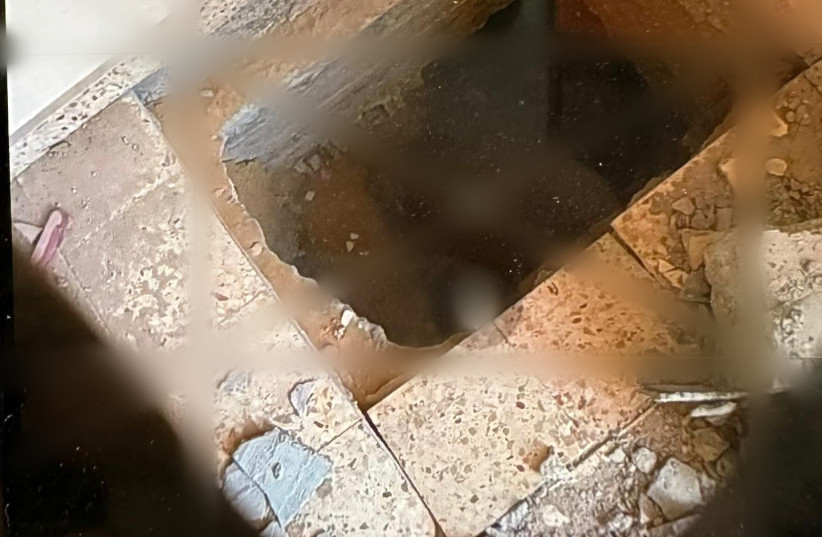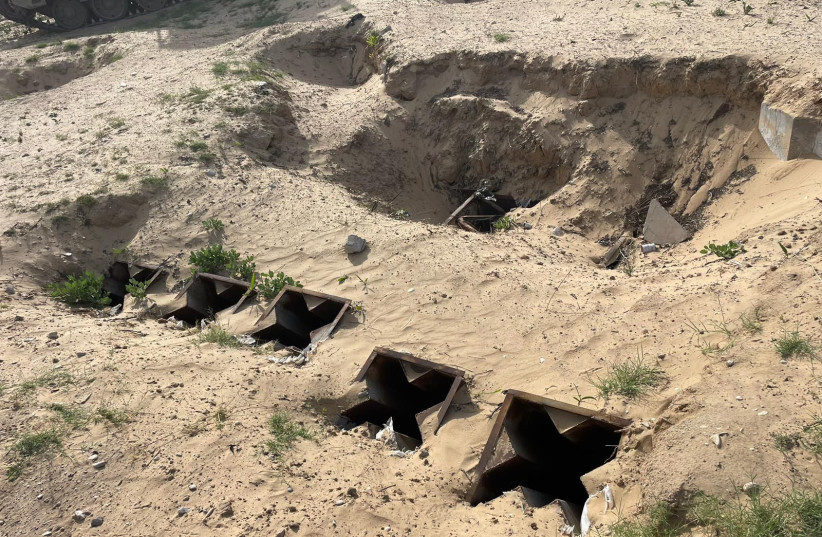RAFAH - Almost seven weeks into the IDF invasion of Rafah, and with major operations there due to being wrapped up any day, the IDF still is far from certain that it has or will find all of the cross-border tunnels between Gaza and Egypt, the Jerusalem Post learned during a visit embedded with IDF forces to the Philadelphi Corridor at the end of last week.
In fact, the estimate for finding and completely destroying all of the cross-border tunnels is likely at minimum six months, but could easily be longer than that.
So far, multiple IDF sources have estimated to the Jerusalem Post that there are at least 25 cross-border tunnels, but these are just initial estimates.
Of all of the tunnel battles the IDF has taken on in Gaza, this is the most important by far because the Philadelphi Corridor is “Hamas’s oxygen” for receiving arms from the outside world, especially from Iran.
October 7 could not have happened without the arms and intelligence training Hamas received through the Philadelphi Corridor.

How can it be that the IDF's progress, while very significant and impressive, could fall significantly short of solving one of the greatest threats to Hamas returning to power?
Doesn’t the IDF, after years of expanding the tunnel special forces unit, Yahalom, and investing billions of dollars in robots, specially trained dogs, customized drones, and a variety of other cutting-edge technologies, have the capabilities to close off this mega-threat?
This is without even getting into the complex geopolitical question, which involves Egypt, the US, the UN, and others, of whether the IDF can prevent Hamas’s return if it withdraws completely from the Philadelphi Corridor.
Even before one gets to that question, if the IDF, currently with full control, cannot root out all of the tunnels, it is hard to see what will stop Hamas from rearming.
Visiting the area up close and discussing the tunnel threat issue with two senior IDF commanders, IDF Col. and Nahal Brigade Commander Yair Zuckerman and IDF Col. and Negev Brigade Commander Elbaz Ivri, the Post got a better understanding of how much harder this job is than most of the public understands.
First of all, when you get to the Philadelphi Corridor, you actually see nothing.

These tunnels are special, long, and deep underground. The only way to really find them is to start with a shaft deep into Rafah, which might have nothing to do with cross-border issues. Then, you excavate and follow every tunnel all the way through to see which ones lead to the border.
IDF sources pointed out tunnel shafts in the Brazil, Shvura, and NPK areas of Rafah to the Post, and all of these were well-concealed and were not immediately obvious to the naked eye.
The Post had to approach the tunnel shafts from multiple angles to pinpoint them and sources indicate that extensive drone observation is poured into this issue.
If finding cross-border tunnels starts deeper in Rafah, and not just on the thinner and shorter Philadelphi Corridor, then the search for them is much larger and more complex.
The cross-border tunnel dilemma would all be a bit easier if the Egyptians were as dedicated to eliminating 100% of cross-border tunnels as the IDF, but IDF sources indicate that they are not.
Why aren’t they? Doesn’t Egypt’s current secular government hate Hamas, which helped the Egyptian Muslim Brotherhood (the parent movement for Hamas) take over Egypt in the early 2010s, almost dethroned military rule there, and nearly imposed a completely new backward religious regime?
In fact, in 2015, Egypt extensively flooded Hamas’s cross-border tunnels with sea water or sewage, destroyed hundreds of Rafah homes (on the Egyptian side) to remove other tunnels, and in 2019 said that a major military operation destroyed another 37 cross-border tunnels.
The IDF has not disputed that Egypt has taken these actions, so how is it that Hamas in 2024 still has so many tunnels?
A heavy underestimation?
In fairness to the Egyptians, like Israel, they may have underestimated Hamas’s capacity to rebuild.
Once neutralized does not mean completely destroyed, and even once destroyed, does not mean forever destroyed. And old-destroyed does not mean new tunnels will not be almost immediately dug.
A regular message from top IDF officials during this war has been that while they had tremendous intelligence about a vast Hamas tunnel network, they still had no concept of how much bigger, advanced, and longer the tunnels were than their estimate.
If the IDF, which sees Hamas as a serious threat, underestimated the terror group and did not get anywhere near all the tunnels even after wars with Hamas in 2008-9, 2012, 2014, and 2021, then why expect better and perfect results from Egypt?
Those who closely followed the 2012 war with Hamas might recall the IDF’s most proud announcement that it had destroyed Hamas’s “metro” – its most important tunnel network.
The current war made it clear that the IDF’s extensive operation against Hamas in 2021, given that the whole conflict lasted only 11 days, was a mere pinprick against the terror group’s tunnel capacity.
All of this is a generous explanation regarding Egypt.
Turning a blind eye
The less generous explanation is that politics shifted for Egypt between 2015/2019 and 2023/2024.
2015 and even 2019 were closer in time to when Hamas helped the Egyptian Muslim Brotherhood against the Egyptian military, and Cairo’s main thought about Hamas was probably still to smash it and any assets, including tunnels, which it had in Egypt.
But at some later point, the politics may have changed.
Most of the world started to see Hamas as a fait accompli that would rule Gaza forever and would need to be dealt with. Egypt’s military regime itself eventually likely started to feel more secure.
Maybe at some point, Egypt’s military regime reached an understanding with Hamas that as long as Cairo preserved certain interests and influence over Gaza’s rulers, the military would look the other way over certain cross-border underground smuggling issues that only negatively impacted Israel.
There is no question that the quantity of criminal smuggling spiked in recent years, and Egypt was doing little to assist Israel in breaking the trend.
If that is true, then Egypt was probably also doing less to crack down on terror smuggling by Hamas.
The Post saw Egypt’s extensive network of watchtowers on the Philadelphi Corridor and while quite useful for spotting any potential above-land invasion, they are nearly useless to combat underground smuggling where the point of origin is deep in Rafah.
IDF sources told the Post that the Egyptians had been embarrassed when confronted with the large number of cross-border tunnels that the IDF had shown them, which Cairo had said no longer existed.
But was it embarrassment in the sense of shock that Hamas had outwitted them? Or was it embarrassment that they understood that the IDF understood that Cairo had decided to look the other way?
Either way, defense sources have indicated that it is not at all clear that Egypt is even eliminating all of the extensions of tunnels that are on its side of the border.
This means that even if Israel eliminates many kilometers of tunnels going from Rafah-Gaza up until the Egyptian border, the continuation of those tunnels may remain neither destroyed nor even neutralized (partially caved in.)
That would make it that much easier for Hamas to reestablish those tunnels if (more likely when) the IDF gives up complete or partial control of the Gaza side of the Philadelphi Corridor or even once the IDF starts to reduce its standing troop presence in Rafah.
With all of that better understood, there is actually very little mystery to the Egypt-Gaza cross-border problem. Absent: several months, if not years, to continue to destroy the tunnels, a jump in cooperation from Egypt, and some way to permanently prevent Hamas from re-digging everything that is destroyed, there should be no expectation that Hamas’s rearmament oxygen will be cut off – it will not.
Rather, the question will be how long will it take Hamas to reconstitute the tunnels sufficiently to start smuggling significant amounts of weapons and will the IDF or whichever third party starts handling aspects of Gaza security try to interdict those weapons at some point within Gaza, or will Hamas rebuild unchallenged.
